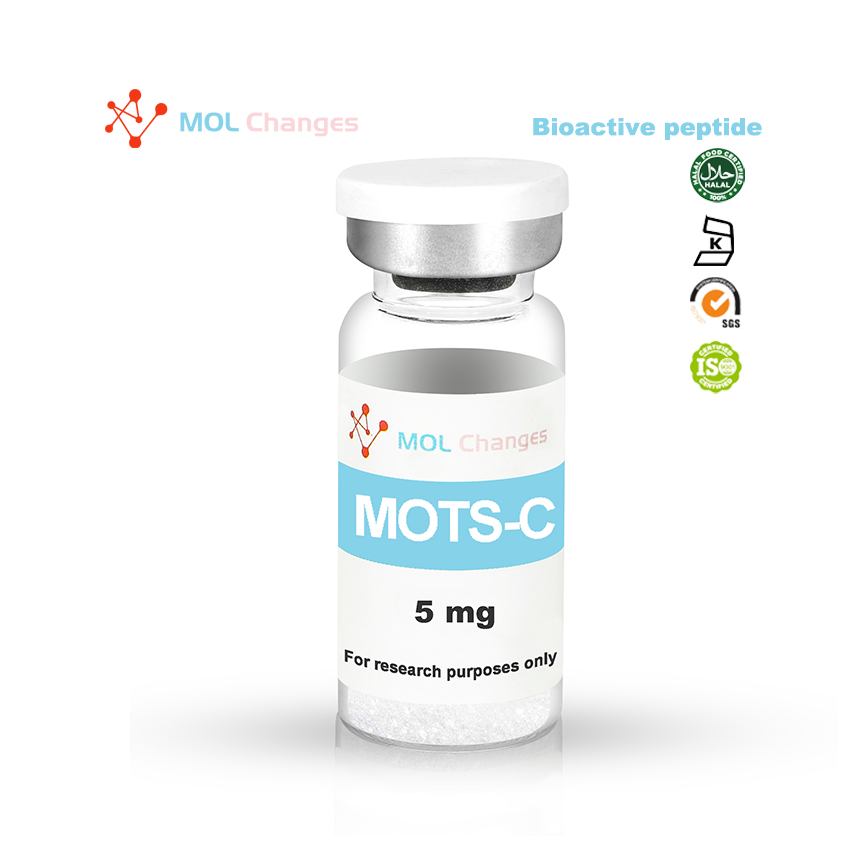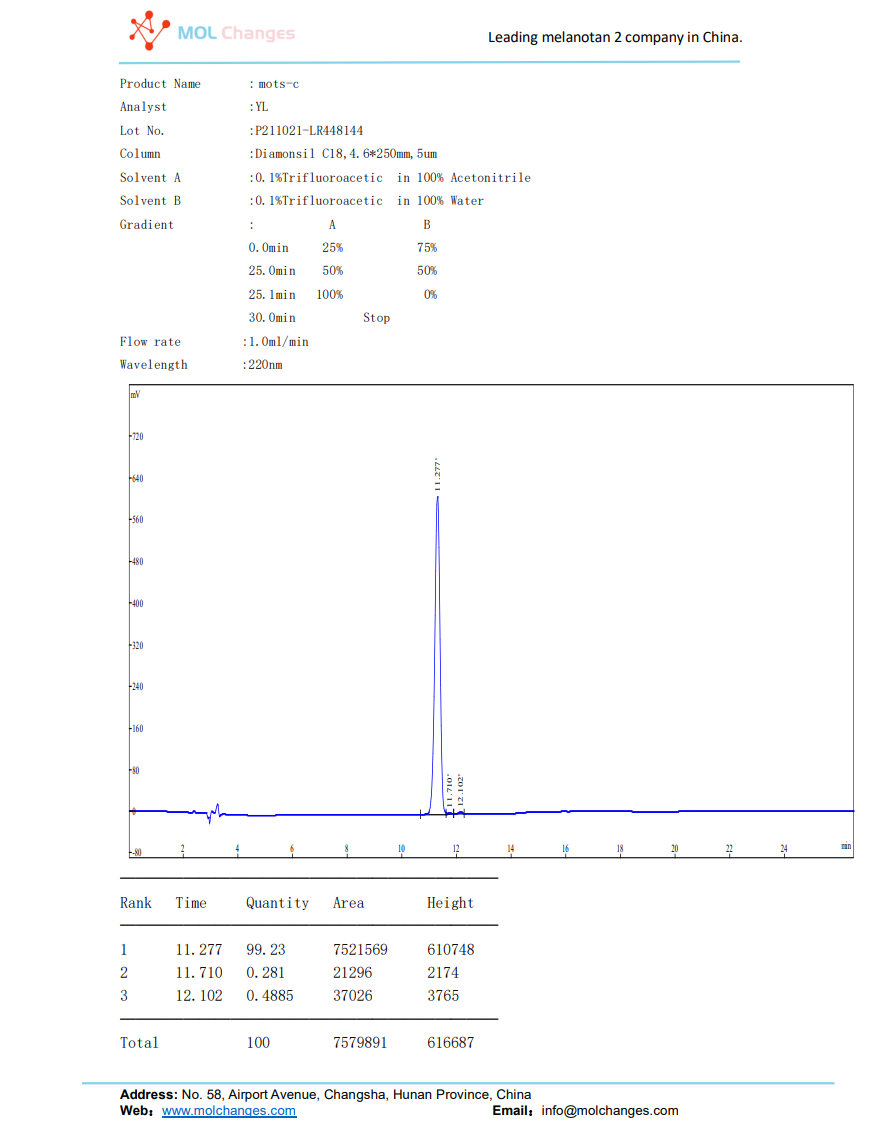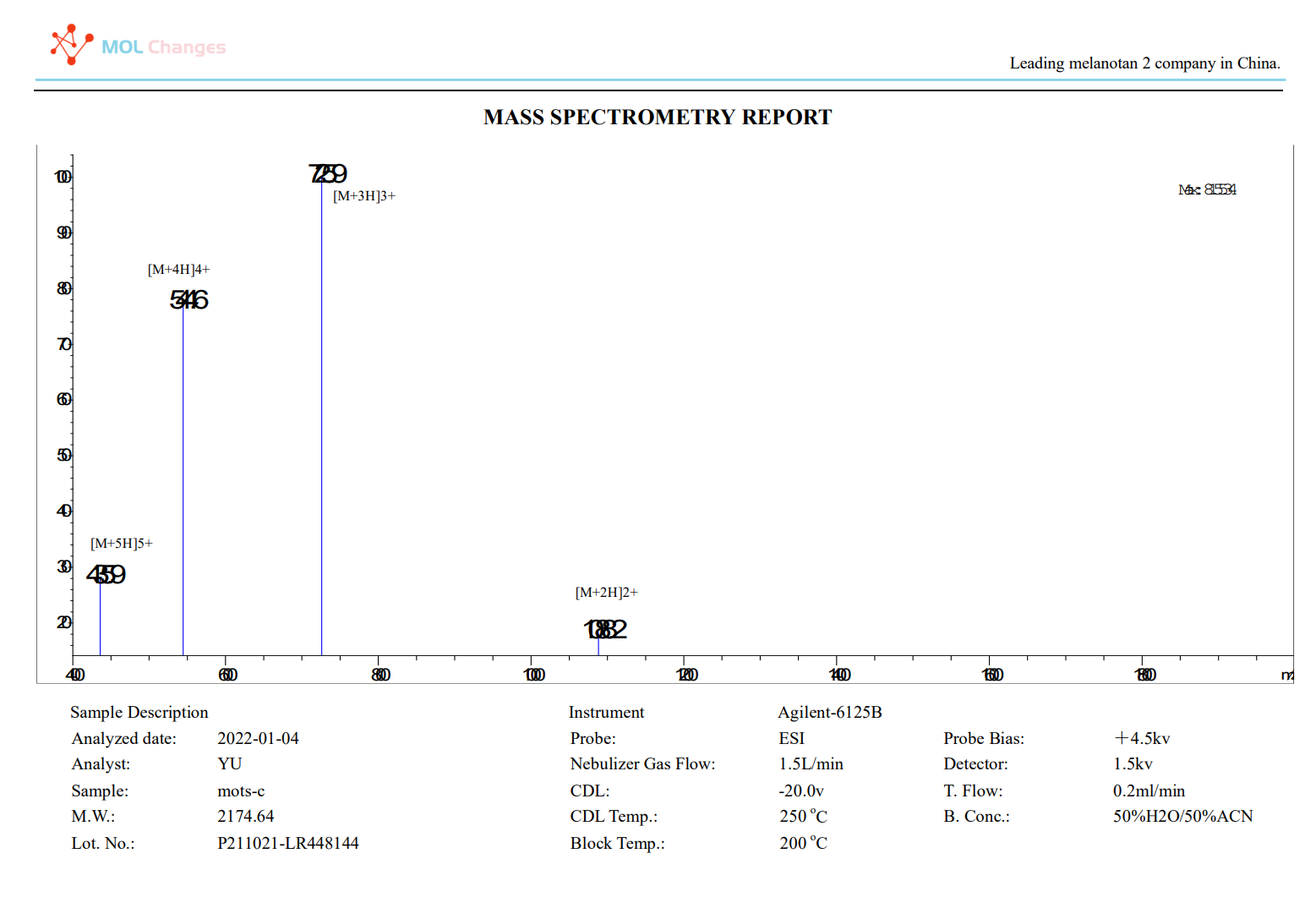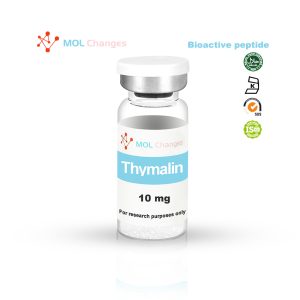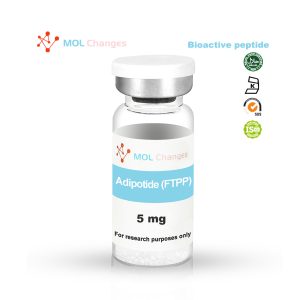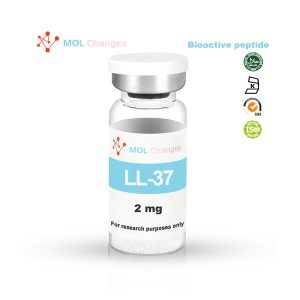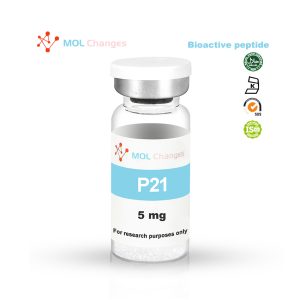
製品情報ナビゲーション
MOTS-Cの構造
- シーケンス:Met-Arg-Trp-Gln-Glu-Met-Gly-Tyr-Ile-Phe-Tyr-Pro-Arg-Lys-Leu-Arg
- CAS番号1627580-64-6
- 分子式:C101H152N28O22S2
- 分子量: 2174.64 g/mol
MOTS-Cとは?
MOTS-cは、Mitochondria-Originally Derived Short Open Reading Frame-cの略で、最近発見された生物学的に活性なペプチドであり、代謝の健康に有望な示唆を与えるものである。このペプチドは、12S rRNAと呼ばれるミトコンドリアゲノムのユニークな部分に由来し、種を超えて保存されていることから、その進化的意義が示唆されている。
MOTS-cは、細胞代謝に関わる様々な調節機能を有し、様々な代謝疾患における治療への応用が期待されることから、科学界で注目を集めている。ミトコンドリア由来ペプチドであるMOTS-cは、ミトコンドリアと核の間の複雑なコミュニケーションネットワークにおいて重要な役割を果たしており、代謝ストレスやエネルギー需要に対する細胞の応答を制御している。
その後のMOTS-cの研究により、代謝に関連する様々な細胞プロセスにおける多様な役割が明らかになってきた。遺伝子発現、ミトコンドリア機能、インスリン感受性、グルコース代謝を制御するシグナル分子として働く。さらに、MOTS-cは脂肪細胞の分化、脂質代謝、細胞ストレス応答の制御にも関与している。
MOTS-cの発見は、ミトコンドリア生物学と代謝調節における研究の新たな道を開いた。科学者たちは現在、代謝異常、肥満、インスリン抵抗性、2型糖尿病におけるMOTS-cの治療応用の可能性を研究している。多くの進展があったが、MOTS-cの作用機序と治療可能性の全容解明は依然として活発な研究分野である!
MOTS-Cエフェクト
MOTS-cはミトコンドリア遺伝子によってコードされる16アミノ酸のペプチドで、全身の代謝恒常性の維持に重要な役割を果たしている。ミトコンドリアはATP産生と脂肪酸酸化の重要な部位であるため、MOTS-cの機能は代謝プロセスの制御に不可欠である。
体内には脂肪酸、アミノ酸、グルコースが自然に蓄えられ、最適な機能を支えている。しかし、カロリーを摂りすぎたり、座りっぱなしの生活を送ったりすると、代謝機能障害が起こることがある。これは体重増加や、2型糖尿病などの代謝関連疾患の発症につながる。
MOTS-cの代謝恒常性を促進する能力は、代謝機能障害に対処し、代謝の柔軟性を高めるための貴重な資産となる。しかし、MOTS-cはミトコンドリアに由来するため、体内のMOTS-cの量は、細胞がミトコンドリアの数を増やすプロセスであるミトコンドリア新生に依存している。残念なことに、加齢とともにミトコンドリアの生合成は低下する傾向にあり、MOTS-cの生産量が減少する。
加齢に伴うMOTS-cの減少に対抗するために、MOTS-cレベルを増加させるペプチド療法を行うことができる。これにより、代謝機能の改善、インスリン感受性の向上、代謝関連の健康状態の管理改善など、複数の効果が期待できる。
研究および前臨床試験に基づくMOTS-cの潜在的な利点と用途をいくつか紹介しよう:
MOTS-cは代謝の健康を促進する
MOTS-cは、インスリン感受性やグルコース調節の改善など、代謝に対する潜在的な効果を示している。肥満や2型糖尿病などの代謝異常の管理に役立つ可能性がある。
MOTS-cの身体的症状
MOTS-cは、ミトコンドリア機能を改善し、エネルギー代謝を高め、筋肉のパフォーマンスを向上させることで、身体能力を高める可能性があることが研究で示されています。ミトコンドリア機能とエネルギー産生を最適化するペプチドとして、MOTS-cは筋肉の成長とパフォーマンスに影響を与える可能性がある。一部のボディビルダーやアスリートは、MOTS-cが脂肪酸酸化とミトコンドリア生合成を促進することによって、筋肉の成長を促進し、運動能力を向上させるのではないかという仮説を立てています。これは、アスリートや運動能力を向上させようとする個人にとって有益かもしれません。新しいサプリメントやペプチドと同様に、使用する前にまず高品質のMOTS-cペプチドを購入することが重要です。ペプチド。株式会社ペプタイドは、ペプチドメーカーとしてペプチドの卸売りを行っています。
MOTS-c アンチエイジング
MOTS-cは、ミトコンドリアの健康を増進し、加齢による衰えを軽減することで、健康的な老化を促進する。MOTS-cは、様々な生理学的プロセスに対する老化の影響を緩和し、全体的な健康に貢献する可能性があります。
心臓保護のためのMOTS-c
予備的な研究では、MOTS-cペプチドが心血管系機能に保護作用を持つ可能性が示唆されている。MOTS-cペプチドは、内皮機能の改善、心機能不全の軽減、抗炎症作用と関連しており、心血管系の健康に役立つ可能性が示唆されている。
MOTS-cは脂肪の代謝に使われる:
MOTS-cは、脂肪蓄積に関与する特定の経路をダウンレギュレートし、β-酸化(脂肪燃焼)を促進することにより、脂肪代謝を調節するようである。これにより、脂肪の蓄積を防ぎ、脂肪のエネルギー利用を高めることができると考えられる。
MOTS-cは骨の健康を促進する
MOTS-cは、骨芽細胞の機能と骨形成を促進する役割を担っている可能性がある。MOTS-cは、I型コラーゲンの合成と骨形成の改善と関連しており、骨の健康と骨粗鬆症のリスク軽減に寄与すると考えられている。
インスリン感受性と糖尿病のためのMOTS-c
インスリン感受性に対するMOTS-cの効果は、インスリン抵抗性と糖尿病のリスクを持つ痩せた人にとって特に重要かもしれない。MOTS-cは、インスリン抵抗性および糖尿病の発症を予防するためのモニタリングツールおよび潜在的介入として使用することができる。
神経保護のためのMOTS-c
神経変性疾患におけるMOTS-cの神経保護作用の可能性は研究されているが、その影響を完全に理解するためにはさらなる研究が必要である。
免疫と炎症のためのMOTS-c
免疫と炎症におけるMOTS-cの役割は現在進行中の研究分野であるが、これらの領域におけるMOTS-cの潜在的な治療的意義はまだ完全には解明されていない。
MOTS-cの副作用と安全性
最新の入手可能な情報では、MOTS-cを用いた試験で重大な副作用は報告されていない。動物実験およびin vitro実験では、明らかな毒性は認められず、良好な結果が得られている。しかし、ヒトにおけるMOTS-cの長期的な安全性と潜在的な副作用を十分に評価するためには、さらなる研究が必要であることを認識することが重要である。
CohBar社が非アルコール性脂肪性肝炎(NASH)および肥満症患者を対象に実施したMOTS-cアナログ(CB4211)の臨床試験では、忍容性および安全性の高いプロファイルが示され、重大な副作用は報告されなかった。これらの知見は、MOTS-cアナログの安全性と潜在的治療効果を理解する上で貴重なものである。
MOTS-cは注射によって投与されるため、注射部位に腫れ、炎症、発赤、結節、痛み、不快感、変色などの副作用が生じる可能性があります。MOTS-c注射を検討する際には、これらの潜在的なリスクを認識しておくことが重要です。高品質のMOTS-cペプチドを購入することも、望ましくない副作用を避けるのに役立ちます。
参考文献
- C.Lee、K. H. Kim、P. Cohen、「MOTS-c:筋肉と脂肪の代謝を制御する新規ミトコンドリア由来ペプチド」、Free Radic.Biol.Med.、100巻、182-187頁、2016年11月。[ピーエムシー]
- H.Luら、「MOTS-cペプチドは脂肪ホメオスタシスを制御し、卵巣摘出による代謝機能不全を予防する」、J. Mol.Med.Berl.Ger., vol. 97, no.4, pp.473-485, Apr.[パブコメ]
- K.H. Kim, J. M. Son, B. A. Benayoun, and C. Lee, "The Mitochondrial-Encoded Peptide MOTS-c Translocates to the Nucleus to Regulate Nuclear Gene Expression in Response to Metabolic Stress," Cell Metab.3, pp.516-524.e7, Sep. 2018.[ピーエムシー]
- S.-J. Kimら, "The mitochondrial-derived peptide MOTS-c is a regulator of plasma metabolites and enhance insulin sensitivity," Physiol.Rep., vol. 7, no. 13, p. e14171, Jul. 2019.[パブコメ]
- R.Crescenzo, F. Bianco, A. Mazzoli, A. Giacco, G. Liverini, and S. Iossa, "A possible link between hepatic mitochondrial dysfunction and diet-induced insulin resistance," Eur.J. Nutr.、55巻、1号、1-6頁、2016年2月。[BMJ]
- L.R. Cataldo, R. Fernández-Verdejo, J. L. Santos, and J. E. Galgani, "Plasma MOTS-c levels are associated with insulin sensitivity in lean but not in obese individuals," J. Investig.Med.、66巻、6号、1019-1022頁、2018年8月。[パブコメ]
- N.Cheら、「MOTS-cはTGF-β/SMADシグナル経路を介して骨芽細胞におけるI型コラーゲンの合成を促進することにより骨粗鬆症を改善する」、Eur.Rev. Med.Pharmacol.Sci.、23巻、8号、3183-3189頁、2019年4月。[パブコメ]
- B.-T.Hu and W.-Z.MOTS-cはTGF-β/Smad経路を介して骨髄間葉系幹細胞の骨形成分化を促進することにより骨粗鬆症を改善する」Eur.Rev. Med.Pharmacol.Sci.、22巻、21号、7156-7163頁、2018年11月。[パブコメ]
- N.福ら、「ミトコンドリア由来ペプチドMOTS-c:A player in exceptional longevity?", Aging Cell, vol.14, Aug. 2015.[研究ゲート]
- Q.Qin et al., "Downregulation of circulating MOTS-c levels in patients with coronary endothelial dysfunction," Int.J. Cardiol., vol.254, pp.23-27, 01 2018.[パブコメ]
- Y.Yangら、「心血管疾患におけるミトコンドリア由来ペプチドの役割:Recent updates", Biomed.Pharmacother.Biomedecine Pharmacother.、117巻、109075頁、2019年6月。[パブコメ]
本ウェブサイトで提供されるすべての記事および製品情報は、情報提供および教育目的のみのものです。
この医師/科学者は、理由の如何を問わず、本製品の購入、販売、使用を支持または推奨するものではありません。商船三井チェンジズは、この医師とは、黙示的か否かを問わず、いかなる提携関係も関係もありません。この医師を引用する目的は、このペプチドを研究している科学者による徹底的な研究開発の成果を認め、賞賛することにあります。
HPLC試験報告書
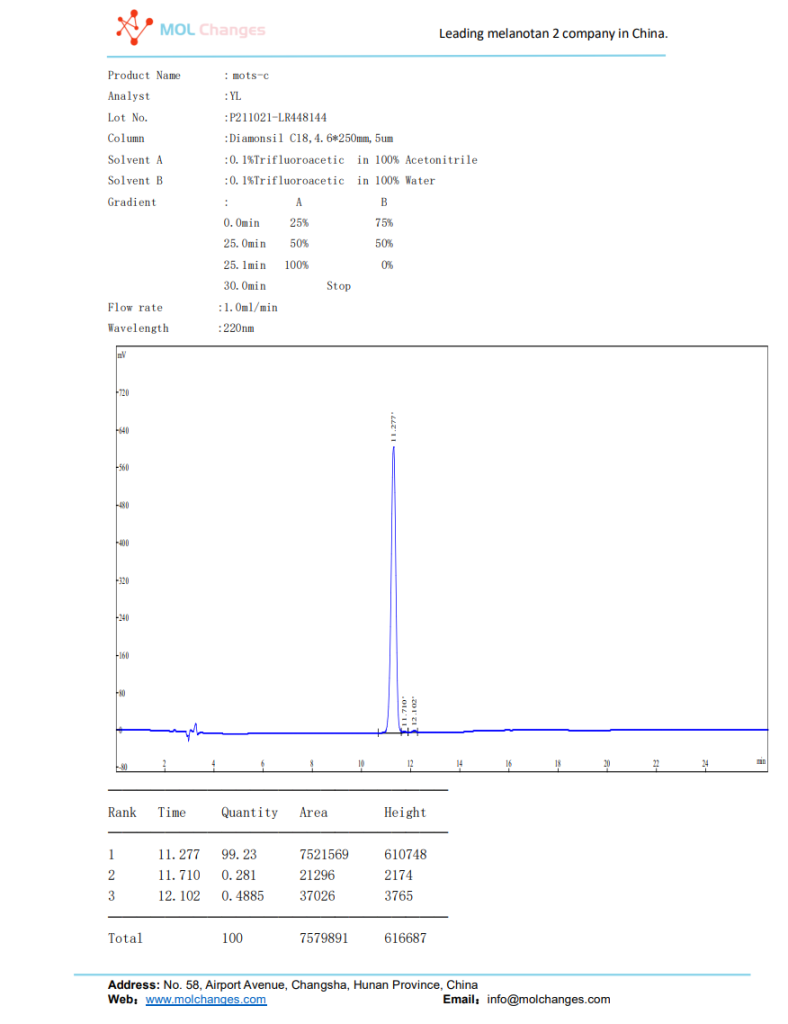
MSテストレポート
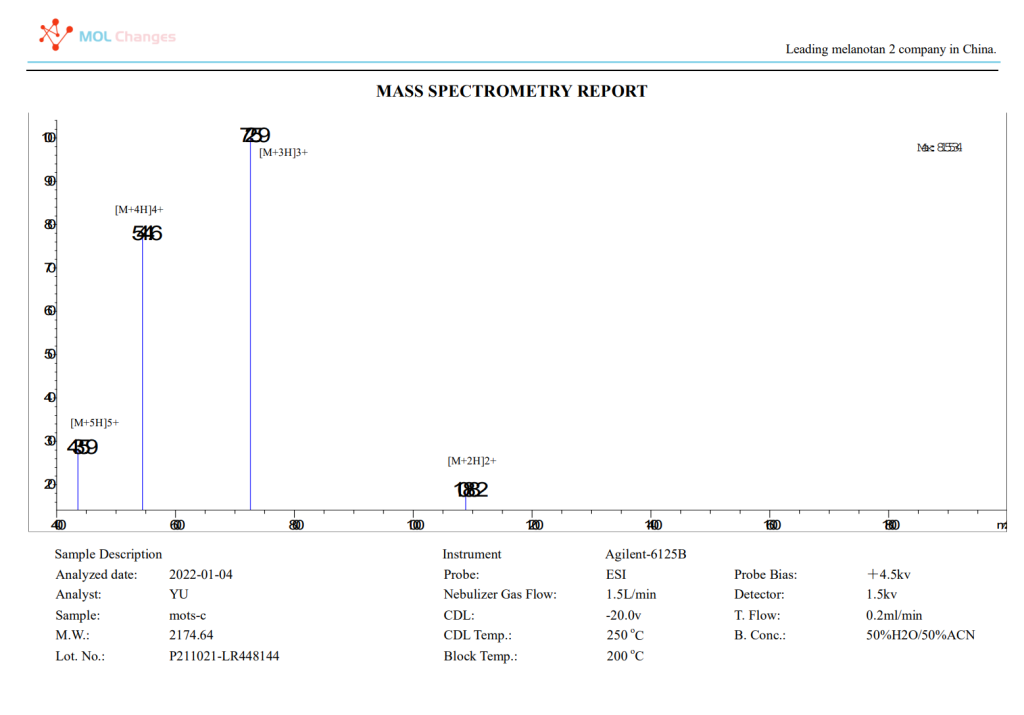
メーカー情報
- MOTS-Cは商船三井Changesの工場で製造されている。
- MOTS-Cサプライヤー商船三井の変更。
- 最大許容生産量:100000本。
- 含有量基準:ネットペプチド。
- 純度:全製品で98%以上。
- カスタマイズ1mg-1g サイズのカスタマイズは受諾可能である

